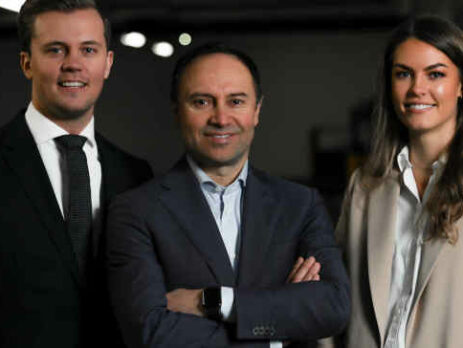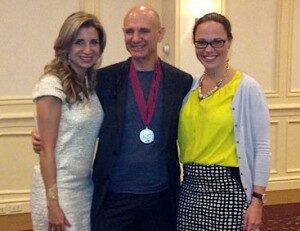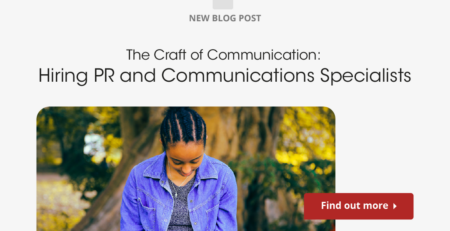How to Land Your First Creative Job
Entering the job market can be challenging, especially in today’s web-focused world. As remote work continues its upward trend and companies search for innovations to stand out against the competition, unique and skilled creatives are in ever greater demand.
The good news is that you don’t have to have decades of experience to land your first creative job. Whether you’re freelance or permanent staff, a unique perspective, strong skill set, and a willingness to learn will take you far. Personality and fitting into the culture also matter more than most people think.
Read on to find out everything you need to know about creative jobs and how to get them.
First Steps Toward a Creative Career
People start their creative careers from a wide variety of places. Before entering the job market, some are graduating from colleges or portfolio schools. Others have no formal education at all. Others are well-established in completely unrelated careers and want to make a fresh start.
Regardless of where you begin, you should make sure you have a few basic creative skills to make your application more appealing. Naturally, the specific skills will vary with the job you want, but there are some things that all creatives can benefit from knowing.
Firstly, do some research to see what kind of creative jobs are out there and dive deeper to find out about the job you want. Even more importantly, find out how it fits in with other creative jobs and the larger business process. Imagination is a key skill for creatives, but finding out how to apply that to the business world is what appeals to hiring managers.
Decision-making is another great thing to understand. Not only should you know how to take decisive action based on research and information, but you also ought to understand how others handle decisions and the impact they can have.
Lastly, communication is invaluable. Creatives have to explain their ideas and projects to stakeholders, people who have a vested interest in the work and are generally not in creative roles themselves. You may also be on a creative team rather than working solo, so communicating effectively is important. Remember that remote communication is becoming more and more important in virtually every industry.
What You Need To Know About Creative Work
You’ve likely already heard loads about users and how to center them in products and services. One of the most important things to know about creative work is that lots of it doesn’t necessarily feel creative.
As UX research becomes more important, creatives are having to learn how to deal with more data than they did in the past. If you aren’t familiar with the basic tenets of marketing, you should take the time to familiarize yourself with them. Even if you don’t want to be a UX/UI designer yourself, understanding how they handle user input can help you produce better work.
Emails, meetings, and datasets might not scratch that creative itch, but you can approach them in creative ways or streamline them so that you can spend more time on the part of the job that appeals to you. For example, you can reduce reliance on emails by having regularly scheduled meetings or live documents that others can cowork and leave comments on.

Common Entry-Level Jobs for Creatives
Sometimes you can jump right into the job you want and improve your skills until you become the team leader or even an upper-level marketing manager. Other times, you have to start a bit lower on the ladder and get promoted to your ideal job. Here are a few of the most common places creatives get their start.
- Assistant Positions
Whatever your particular area of interest, there may be a junior or assistant version of that role that you can step into and get some on-the-job training before you become the full-fledged version.
Inquire about this kind of position or look for it on job boards. On rare occasions, companies might be interested in creating a role like this to allow you to become acquainted with their way of doing things or build up your skills.
- Proofreaders
For people who want to be copywriters or content writers, being a proofreader could be the first stepping stone. It demonstrates that you have a good handle on grammar and can recognize mistakes. Plus, you’ll be familiar with how professional writing looks and feels before you get into the work yourself.
- Entry-level Designer
Smaller businesses who are just learning how to apply design thinking to their companies build roles for basic creative work and usually look for people with skills but not tons of experience to test things out. The role may not be fleshed out completely, which could be confusing. But it also allows you to build the role yourself.
People who find such positions are likely to stay with the company for longer because they are a natural fit for the role they design for themselves. Of course, they won’t stay at the entry-level job, but they’ll help the company grow its creative side.
- Marketing Specialist
Most creatives find their professional home in the marketing department. Graphic designers, writers, and even programmers are usually housed in that section of the company hierarchy.
Becoming a marketing specialist will help you understand how these creative roles fit into the business and give you space to learn how to tailor your creative skills for products and services. You usually have contact with people up and down the company line so you can get a sense of how the whole company works.
How to Start a Creative Career
Searching for creative jobs is only part of the process. There are a few other things you can do when you’re entering the job market to be more effective and reduce the time you spend unemployed. Try a few of these strategies to make sure you’re ready when you do start applying to creative jobs.
1- Use Your Skills
Whether you’re a graphic designer, programmer, or UX/UI designer, you have to be able to show what you know to prospective employers. Even if you’ve never had any actual professional work assignments, you can still make your samples.
For most creatives, this is no problem. They have to practice their skills anyway and the production is how they express their creative drive. Make sure you frame your sample work in a professional format so non-creatives can see the value in it when they examine your portfolio.
2- Take Credit
When we work with our friends and colleagues, taking credit can feel selfish. But when you do have team projects, you need to be able to identify which part you worked on and what you understand about the parts of the work you didn’t do.
Many people fall into the trap of claiming credit for more than they did. This could make you look foolish and destroy any budding trust between you and the company. The interviewers will be much more impressed if you can display knowledge about additional areas than if you claim credit for entire projects.
3- Find What You Like
One of the most common interview questions for creatives is to choose examples of work that they have seen and liked. You don’t necessarily have to brown-nose and find examples from the company you’re applying to, although some awareness of the work they put out will be good to have.
Make sure you have some recent and relevant examples of creatives or products that have impressed you. If you can explain how it felt to experience as a user and how you want to include that in your future work, the company is sure to be impressed.
4- Plan for the Future
Work is changing all the time, especially in the last few years. By all indications, it will continue to do so. See what professionals are saying about the job you’ve chosen and see what the future may have in store so you can be prepared.
You should also decide what you want for your future and find a job that will help you get there. Maybe you want to achieve a certain position or maybe you want a particular work-life balance. If you decide what you want earlier you’re more likely to get there and the clarity will impress any interviewers who ask.
Is Creative Work Unstable?
A huge worry for people who decide to pursue their passion for creative work is that the jobs will disappear. A large part of the reasoning behind this worry is that businesses don’t value creative work and will get rid of their teams when the economy takes a turn for the worse.
However, many companies are seeing real value returned from design-driven marketing and product design. Creatives are becoming as essential to good business as more traditional employees are.
That’s not to say that you’ll never be let go from a creative job, but you can bet that companies who hire for permanent positions usually genuinely value their creative staff. Effective work makes this even more likely.
Should You Work for the Money?
It’s no use pretending the salary isn’t a motivator for everybody, even creatives. But that doesn’t mean you should chase the bag exclusively. If you focus on other benefits you’re more likely to be satisfied for longer.
For example, many employees report that flexible work from home or remote work options are huge incentives. They allow for a better work-life balance and in many cases allow the employee to be more productive because they are free of distractions like coworkers and in-person meetings.
Entry-level jobs generally aren’t the highest paid for obvious reasons. But your desired salary is likely to be a question in the interview, so you should think about what your ideal salary would be. As long as you can justify it and it’s not sky-high, the company will be glad to see you’ve put some thought into the matter even if they can’t meet your desired number.
When you advance in your creative career, you’ll find that creatives are paid quite well in most cases. Creatives in higher positions make similar salaries to workers in other fields. At boutique firms and corporations, the starving artist trope isn’t very well represented.
The Best Way to Find Jobs for Creatives
You can scour internet job boards all you want, but that perfect entry-level job is likely to elude you or get tons of applications. That can cause the hiring process to take ages and put you in competition with a huge number of other creatives looking to break into the industry.
Entering the job market as a creative is easier if you sign up with a creative staffing agency. At icreatives, we have tons of experience reviewing applicants and linking them with the best companies in the business. If you are accepted to join our team, we have opportunities in a variety of fields and businesses.
Signing up with icreatives is a simple process and it eliminates the need to fill out tons of paperwork. Apply with us one time and we’ll send your resume out to many clients once it’s accepted. Whether you want to work part-time, full-time, remotely, or on contract, icreatives can help you find work in your field.
Professional Creative Networking
The internet has changed how companies look at prospective employees and nothing exemplifies that more than LinkedIn. A strong LinkedIn profile can help you stay in touch with professional contacts and show your skills to potential employers.
Take the time to connect with people when you’re still in the learning stages so you can have a strong profile by the time you’re applying for jobs. Even if you use icreatives to find work, connecting with others and networking is important for continuing professional education as much as it is for the initial entry-level job search.
When it comes to other websites, make sure you don’t have anything public that you wouldn’t offer to show during a job interview. Facebook and other social media sites have caused many people to inadvertently sabotage their applications with unprofessional pictures. It’s an annoyance, but locking your profile or posting under a pseudonym will save you a headache in the application process.
Is A Creative Career For Me?
This is the most important question to ask yourself before you go about honing a creative skill and finding a suitable job. In many ways, a creative career isn’t much different from a more traditional one. Work is usually done on teams and with set assignments.
The most important thing you can have for a creative career is passion. If it’s not for the work itself, it should be for the craft. If you’re always craving more knowledge and want to stay on the cutting edge, it will help prevent stagnation and keep the work fresh and interesting for you.
Creative ideas and the professional world clash a bit. If you aren’t ready to potentially see your idea get turned down or even ripped to shreds, then a creative career might not be the right match for you. However, if you’re spurred on by that kind of challenge, you’ll be a great fit.
It might not all be glamorous creative work, either. You might be redesigning buttons and specific features of an app or website rather than trailblazing with a brand new product. But even the smaller projects allow creatives to approach problems and come up with ways to solve them. The drive to crack mysteries and engage users with storytelling and clever design thinking is an essential quality for successful creatives.

Conclusion:
Entering the job market can be intimidating, but creatives can prepare themselves with the right mindset and planning. Skillbuilding is one thing, but today’s digital world also requires knowledge of social media sites like LinkedIn and tons of software.
Understanding design thinking and user-centered products will help you get ahead as well. Creatives can shorten the job application process by signing up with a creative staffing agency to find work. Research into your chosen field can also help demystify the world of professional creative work.
Whatever your particular field is, landing your first creative job is a crucial stepping stone for building a career. You can make sure your first job sets you on the right path with some of the tips in this guide.












